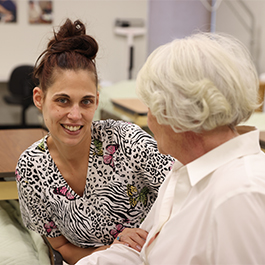
Nursing Assistant
This 84-hour, 3-credit, state-approved course presents curriculum to develop skills, attitudes, and knowledge essential in giving direct and supportive care as a nursing assistant. After successful completion of the course, students are required to take the Minnesota Nursing Assistant Test.
This class meets the Minnesota Department of Health (MDH) standards. Students practice skills in a supervised laboratory setting and in a clinical environment in long-term care.
The CNA certification is a pre-requisite for the Practical Nursing program.
Course Schedule
| Title | Download Link |
|---|---|
| ATCC Nursing Assistant Training 03 - Mar-Apr 2026 - Hybrid | Download ATCC Nursing Assistant Training 03 - Mar-Apr 2026 - Hybrid Document pdf |
| ATCC Nursing Assistant Training 04 - Apr-May 2026 - Hybrid | Download ATCC Nursing Assistant Training 04 - Apr-May 2026 - Hybrid Document pdf |
Schedule subject to change. Official schedule will be distributed on the first day of class.
- The process to obtain a MDH background study with fingerprinting and photo identification will be started on the first day of class.
- Signature-bearing Picture ID (driver's license preferred) required on the first day of class.
- Students are required to provide their social security number at registration.
- The minimum age recommended to take this course is 16.
Due to the accelerated nature of this course, students are expected to be in 100% attendance during classroom, skills, and clinical work experience. Any skills practice/lab/clinical time missed will require the student to pay for private tutor time with the instructor.
A calendar listing all training dates and times, as well as topics covered will be provided to the student the first day of class. Textbooks and materials are included in class fee.
The following are included in the training:
- Introduction to healthcare and the role of the nursing assistant
- Basic human needs, growth, development, body system basics, and common chronic conditions
- Communication with residents and staff; adapting communication to include those with sensory deficits and traumatic brain injury
- Caring for residents cross-culturally
- Safe and clean environment, response to emergencies, and the principles of infection control
- Purpose and procedures for obtaining vital signs and measurements, and O2 safety
- Purpose and skills related to personal cares for residents
- Purpose of activity and exercise, correct technique for transfers, positioning, and range of motion
- Nutrition and fluids, diets, hydration, assisting with eating, and alternate nutrition
- Elimination, bowel and bladder care, colostomy care, and urinary catheter care
- Caring for residents with special needs, behavioral health, developmental disabilities, dementia, death and dying
- Practice of skills that will be needed in nursing home
- Clinical experience with residents in a nursing home facility

